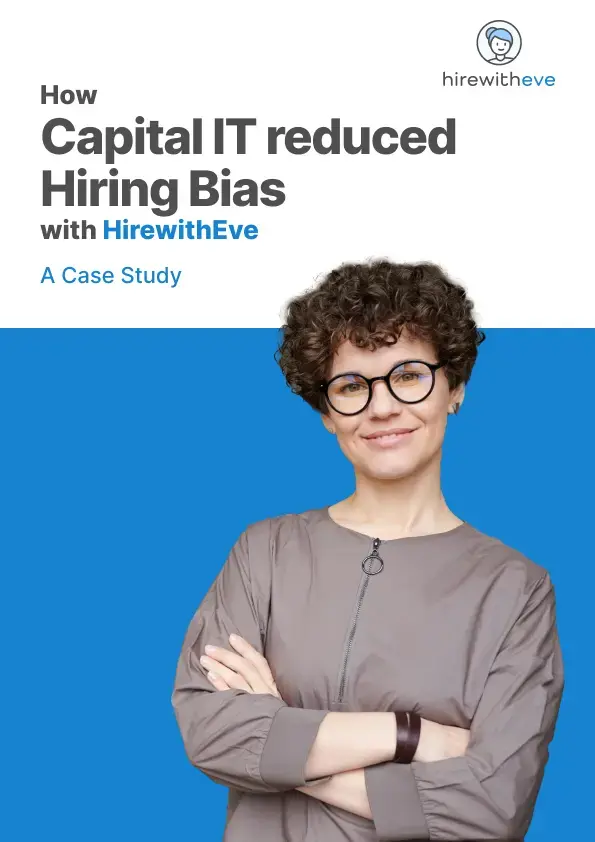Revolutionizing Hiring: Degrees vs. Skills

Revolutionizing Hiring: Degrees vs. Skills

The Changing Landscape of Hiring
The job market has undergone a seismic shift in the past few decades. Once, a degree was seen as the golden ticket to career success, but today, the hiring landscape is evolving at an unprecedented pace. Talent acquisition specialists and HR managers are at the forefront of this change, grappling with new challenges and opportunities to find the best talent.
In this blog, we will explore the future of hiring, focusing on whether a degree is still the key to career success. We'll delve into how the market is shifting towards skills-based hiring, the role of technology in this transformation, and how tools like HirewithEve are paving the way for a new era in talent acquisition.
The Role of Degrees in the Modern Job Market
For decades, a degree was essential for securing a good job and climbing the career ladder. However, this traditional viewpoint is being challenged as the job market evolves. While degrees still hold value in many sectors, there is a growing emphasis on skills and practical experience. This shift is particularly pronounced in technology-driven industries, where the ability to adapt and learn quickly can outweigh formal education credentials.
Table of contents
The Evolution of Career Success
The Current State of Hiring
The Skills Over Degrees Movement
How HirewithEve is Revolutionizing Hiring
The Future of Hiring
Actionable Steps for HR Managers
Conclusion
The Evolution of Career Success
Historical Perspective: Degrees as the Standard
The idea that a degree is necessary for career success is deeply rooted in history. In the past, higher education was seen as the primary way to gain specialized knowledge and access to prestigious careers. Employers rely on degrees as a key indicator of a candidate's qualifications and potential.
However, the world of work has changed dramatically. Automation, globalization, and the rise of the gig economy have all contributed to a more dynamic and unpredictable job market. As a result, the correlation between holding a degree and achieving career success is no longer as strong as it once was.
Shifting Perspectives: Skills vs. Degrees
Today, employers are increasingly prioritizing skills over degrees. This shift is driven by the need for employees who can quickly adapt to new technologies and work environments. In many industries, the rapid pace of change means that the skills learned in a degree program may quickly become outdated.
Moreover, there is a growing recognition that not all valuable skills can be taught in a classroom. Soft skills, such as communication, problem-solving, and teamwork, are becoming more critical in the workplace, and these are often developed through experience rather than formal education.
The Role of Technology in Shaping Hiring Practices
Technology is playing a pivotal role in this shift towards skills-based hiring. With the advent of AI and machine learning, companies can now assess a candidate's abilities more accurately and efficiently. Tools like HirewithEve are at the forefront of this revolution, enabling HR managers to evaluate candidates based on their skills, experience, and potential, rather than just their educational background.
The Current State of Hiring
What HR Managers Are Saying About Degrees
HR managers across various industries are beginning to question the importance of degrees in the hiring process. While degrees are still valued in certain sectors, there is a growing consensus that they are not always the best predictor of job performance.
According to recent surveys, many HR professionals believe that the focus should shift toward evaluating a candidate's skills, experience, and cultural fit. This sentiment is particularly strong in tech-driven industries, where the demand for specialized skills often outstrips the supply of qualified graduates.
Industry Insights: Sectors Where Degrees Still Dominate
Despite the growing emphasis on skills, there are still industries where degrees remain essential. For example, in fields such as medicine, law, and engineering, formal education and credentials are critical. In these sectors, a degree is often a regulatory requirement, and there is little room for flexibility in hiring practices.
However, even in these traditionally degree-focused industries, there is a growing recognition of the importance of continuous learning and skills development. As technology continues to disrupt these fields, professionals must be able to adapt and acquire new skills throughout their careers.
Skills-Based Hiring: The Growing Trend
Skills-based hiring is gaining traction across many industries. This approach focuses on identifying and hiring candidates based on the specific skills they possess, rather than their educational background. By using tools like HirewithEve, HR managers can create detailed profiles of the skills required for each role and assess candidates accordingly.
This shift towards skills-based hiring is particularly beneficial in fast-paced industries, where the ability to learn and adapt quickly is more important than holding a specific degree. Moreover, it allows companies to tap into a broader talent pool, including individuals who may not have followed a traditional educational path but possess the skills and experience needed to excel in the role.
The Skills Over Degrees Movement
Why Skills Matter More Than Ever
In today's rapidly changing job market, skills have become the currency of success. Employers are increasingly looking for candidates who can demonstrate specific abilities that align with the demands of the role. Whether it's coding, data analysis, or project management, having the right skills can make all the difference in landing a job and advancing in a career.
Moreover, the rise of remote work and the gig economy has further highlighted the importance of skills. In these environments, the ability to work independently and manage one's workload effectively is crucial. As a result, employers are placing greater emphasis on practical experience and proven abilities, rather than just educational credentials.
Real-World Examples of Skills-Based Hiring Success
Several companies have successfully adopted skills-based hiring practices, leading to better outcomes for both employers and employees. For example, leading tech companies like Google and IBM have moved away from requiring degrees for many positions, focusing instead on assessing candidates' skills and potential.
These companies have found that by prioritizing skills over degrees, they can access a wider talent pool and bring in candidates who may have been overlooked in a traditional hiring process. Moreover, this approach has led to higher employee satisfaction and retention, as candidates are more likely to be hired for roles that align with their strengths and interests.
Challenges in Implementing Skills-Based Hiring
While the benefits of skills-based hiring are clear, there are also challenges to consider. One of the main obstacles is the difficulty of accurately assessing a candidate's skills, particularly in a remote or virtual hiring process. This is where tools like HirewithEve can make a significant difference.
HirewithEve uses advanced algorithms and machine learning to evaluate candidates' skills, experience, and potential. By automating this process, HR managers can ensure a more accurate and objective assessment, leading to better hiring decisions and outcomes.
How HirewithEve is Revolutionizing Hiring
HirewithEve: A New Approach to Talent Acquisition
HirewithEve is a cutting-edge talent acquisition platform designed to help HR managers and talent acquisition specialists navigate the complexities of modern hiring. Whether you're focused on skills-based hiring or looking to streamline your traditional hiring processes, HirewithEve offers a range of tools and features to support your needs.
Key Features of HirewithEve for Skills-Based Hiring
Skills Mapping and Assessment: HirewithEve allows you to create detailed profiles of the skills required for each role and assess candidates based on these criteria.
AI-Powered Candidate Matching: The platform uses advanced algorithms to match candidates with roles that align with their skills and experience.
Automated Screening: Save time and reduce bias by automating the initial screening process.
Real-Time Analytics: Get insights into your hiring process with real-time analytics and reporting.
The Future of Hiring
Predictions: The Role of Degrees in 2030
Looking ahead, it's clear that the role of degrees in the hiring process will continue to evolve. While degrees will likely remain important in certain sectors, the shift towards skills-based hiring is expected to accelerate. By 2030, we may see a more balanced approach, where degrees are just one of many factors considered in the hiring process.
The Increasing Importance of Continuous Learning
As the pace of change continues to accelerate, continuous learning will become increasingly important for career success. Employers will need to focus on creating a culture of continuous learning, where employees are encouraged to develop new skills and adapt to changing demands.
HirewithEve is well-positioned to support this shift, offering tools and resources to help HR managers assess and develop their employees' skills over time. By integrating continuous learning into the hiring process, companies can ensure they remain competitive in a rapidly changing job market.
How to Prepare for the Future as an HR Manager
To prepare for the future of hiring, HR managers will need to embrace new technologies and approaches. This includes adopting skills-based hiring practices, leveraging AI-powered tools like HirewithEve, and fostering a culture of continuous learning within their organizations.
By staying ahead of these trends, HR managers can ensure they are well-equipped to attract and retain top talent in the years to come.
Actionable Steps for HR Managers
Transitioning to a Skills-Based Hiring Model
Making the shift to a skills-based hiring model can be challenging, but with the right tools and strategies, it is achievable. Start by mapping out the key skills required for each role in your organization and then use tools like HirewithEve to assess candidates based on these criteria.
Leveraging HirewithEve to Improve Hiring Outcomes
HirewithEve offers a range of features designed to improve your hiring outcomes. From automated screening to AI-powered candidate matching, the platform can help you streamline your hiring process and ensure you find the best candidates for each role.
Building a Culture of Continuous Learning in Your Organization
To succeed in the future of hiring, it's essential to build a culture of continuous learning within your organization.
Encourage employees to develop new skills, provide opportunities for ongoing training and development, and use tools like HirewithEve to support this process.
Conclusion
Degrees vs. Skills
As we've explored in this blog, the role of degrees in the hiring process is changing. While degrees still hold value in many sectors, there is a growing emphasis on skills and practical experience. This shift is being driven by the rapid pace of technological change and the increasing importance of adaptability and continuous learning.
Why HirewithEve is the Right Choice for the Future of Hiring
HirewithEve is a powerful tool that can help HR managers navigate this changing landscape. Whether you're looking to transition to a skills-based hiring model or simply streamline your existing processes, HirewithEve offers the tools and features you need to succeed.
Final Thoughts: Embracing Change in the Hiring Process
The future of hiring is bright, but it will require HR managers and talent acquisition specialists to embrace change and adopt new approaches. By focusing on skills, leveraging advanced technologies, and fostering a culture of continuous learning, you can ensure your organization is well-prepared for the challenges and opportunities ahead.
Target Your Talent
Unlock tailored solutions for your recruitment and hiring needs with Eve Platform's extensive case study library.
Subscribe now to enhance your HR expertise and excel in your role.
Free Resources

Transforming Hiring: 7 Key Recruiting Metrics
Enhancing recruitment processes with data-driven insights for better hiring outcomes.

Reducing Hiring Bias with Hirewitheve.
Utilizing Hirewitheve to combat bias and streamline recruitment processes effectively.

Hiring Detail-Oriented Candidates
HirewithEve enhances hiring by accurately assessing candidate's attention to detail-oriented.
